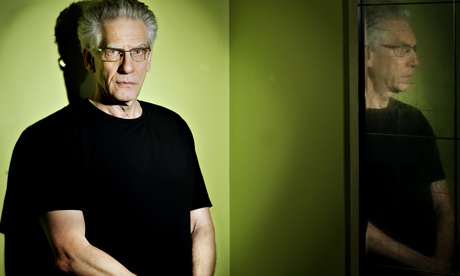
The first novel by the film director David Cronenberg is in part a dramatic catalogue of highly desirable electronics equipment. A globetrotting couple of freelance journalists, Nathan and Naomi, are forever thinking about and fiddling with their cameras, and lusting after ones they don't yet own. ("The new D4, the one he didn't have, could shoot at a surreal ISO 204,800.") Not immune to such hardware fetishism myself, I was especially taken with several loving descriptions of a "Swiss Nagra Kudelski SD audio recorder", and then I looked up the price, which it is not excessive to call eye-watering. These guys, I thought, are doing pretty well for freelancers.
The protagonists' acquisitive desire for the latest gadgets is, it turns out, part of the novel's pungent stew of themes punning on the book's title: consumerism, in the ordinary sense of wanting to shop, but also cannibalism, and "consumption" as a very odd new disease, rather than its historical meaning of tuberculosis. Aficionados of Cronenberg's cinematic work will not be surprised to find a lot of exquisitely detailed, voyeuristic body-horror: people's physical parts are exposed, wired up, or cut off in carefully lit scenes, always being filmed or photographed by the characters.
At the centre of the plot is a French celebrity-philosopher couple in their sixties, Aristide and Célestine Arosteguy. They are like a po-mo Sartre and de Beauvoir, known for seducing (and sharing) their students and writing neo-Marxian denunciations of commodity culture. They say excellently Parisian things like: "The only authentic literature of the modern era is the owner's manual." But now Aristide has fled, accused of killing and then eating bits of his devoted wife. Naomi follows his trail to Tokyo, where he tells her: "I expect soon to feel the Hannibal Lecter resonances."
Meanwhile, Nathan meets a rogue Hungarian surgeon, Dr Molnár, who photographs his patients while drugged and/or naked and exhibits the resulting art in a neighbourhood restaurant. Nathan has sex with Molnár's doomed patient Dunja, who says things like: "While I'm still alive, I'll have nothing special left to seduce with except the scent of dying. That will be my lethal perfume." She gives Nathan a dose of a sexually transmitted disease long thought extinct, so he travels to the US to meet the disease's discoverer, Dr Roiphe, whose daughter has picked up some very strange habits from a sojourn in – where else? – Paris. Roiphe wants to collaborate on a book with Nathan. It will, of course, be called Consumed.
Cronenberg handles his material with the same ironic, observant affect with which the Arosteguys interpret the modern world. The novel is driven by a fascination for the interplay between technology and sex: there is an extended episode of close-up iPhone cock photography, an artwork using 3D-printed body parts, and a set of hi-tech hearing aids specially tuned so that a man can hear the insects allegedly living inside his wife's breast. (Fans of Cronenberg's The Fly will enjoy the entomological interludes.) A man says to a woman: "Let me unbox you" – alluding to the video genre in which geeks delicately open the packaging of new gadgets. A woman muses playfully about "the sexuality of camera apertures", deciding that "stopping down the fixed 35mmm lens's diaphragm … to a tight f/16 would be the equivalent of executing a Kegel pelvic floor exercise". It reads somewhat like a mashup of William Gibson, the king of near-future SF cool, and 1970s horror maestro James Herbert.
The 21st century's version of the hall of mirrors is the infinite regress of embedded recording devices. Naomi and Nathan are always stealthily recording their conversations with other characters by means of some hidden app on a MacBook Air or iPhone, when they are not overtly putting obscenely expensive Swiss voice recorders on glass coffee tables. Cronenberg's fiction is one of omnipresent multimedia surveillance and retention, though we never witness the heroes performing the subsquent grunt work of transcription and editing. Perhaps deliberately, because a major plot question becomes what one can trust of electronic recording, and what was only cleverly fabricated using Photoshop or its video equivalents.
Eventually even the North Korean leader Kim Jong-un becomes an offstage character, and everything coalesces into a pleasingly suggestive global conspiracy. But it is Cronenberg's forcefully imagined tableaux of decadent and weirdly romantic depravity that seem to constitute the novel's raison d'être. By the abrupt and menacing end, you feel that you've lived in, and been forced to look at, an intense and surreal modern vision of the thousand unnatural shocks that flesh is heir to. And then you might begin to feel a bit peckish.
• To order Consumed for £14.99, go to bookshop.theguardian.com or call 0330 333 6846.

